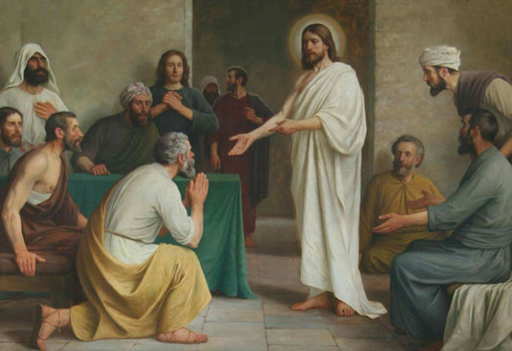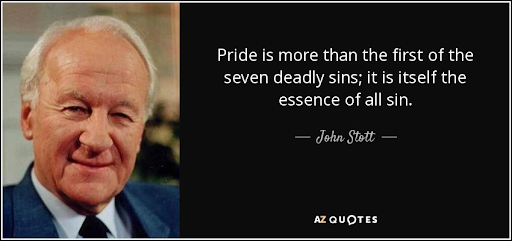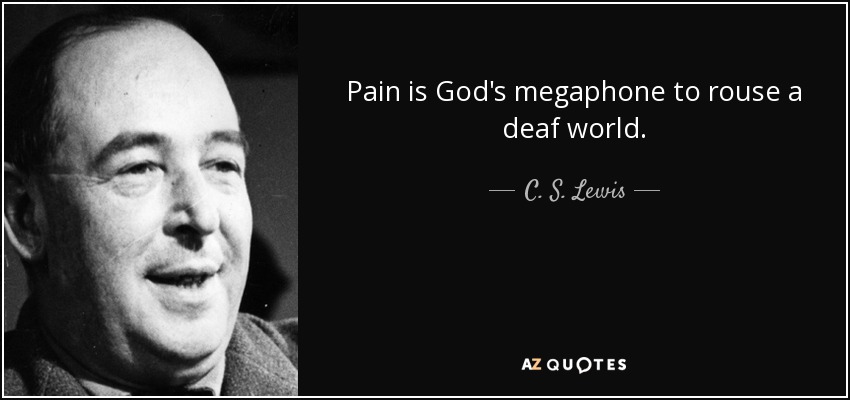- Have we replaced the Lord's Supper with "one guy and his pulpit"?
- Have we memorialised and marginalized the Lord's Supper to elevate the role of preaching?
- Do you believe in Jesus' presence at the Supper? Should we have a high view of the Supper?
There is a particular chapel that had a communion table with a stained-glass window above it depicting the scene from the Gospels where the women visited the empty tomb. The words of the angel to the women, "He is not here!" were inscribed underneath the window. So, ironically, whenever you looked at the communion table, you could see the words "He is not here!" Does this sum up how many people feel about the Lord's Supper (or Communion or Eucharist)? Jesus is remembered, but he is not present! But that is a deficient view of the Supper; Jesus' presence is the whole point!
Paul says, "For whenever you eat this bread and drink this cup, you proclaim the Lord's death until he comes" (1 Cor 11:26). So the meal looks forward to the Lord's bodily return and thus presupposes his bodily absence in the interim. So whatever presence we have in the Eucharist, it is not Jesus's physical body that is present since his glorified body is exclusively located in heaven.
There is no denial by anyone, including Catholic and Orthodox, that the Eucharist is a memorial meal of sorts since the Eucharist commemorates and celebrates the sacrificial death of Jesus Christ. However, there is clearly more to the Eucharist than the memory of Jesus's death and reminding us that Christ is with us.
Consider the two travelers to Emmaus. They told the disciples how they met Jesus on their journey and how he was made known "to them in the breaking of the bread" (Luke 24:35). The eucharistic echoes are transparent here. Luke is evidently pointing ahead to Acts 2, where the disciples were dedicated to "breaking bread" together in their fellowship (Acts 2:42, 46). When the disciples met together to break bread, they also met with Jesus in the bread.
In addition, Paul teaches about a real encounter with Christ through the elements. Through the wine, there is a real "participation" in the blood of Christ, and through the bread, there is a real "participation" in the body of Christ (1 Cor 10:16). The Greek word for "participation" is koinōnia, meaning "fellowship" or "sharing." Plain as day, through bread and wine, we actually commune with Christ, and this communion requires an exclusive allegiance that forbids us from partaking of pagan sacrifices. The bread and wine of the Eucharist actually fosters a vertical communion with the exalted Christ and facilitates a closer horizontal relationship with fellow believers.
The other thing is that the early church quickly developed the notion of a real presence of Jesus at the Eucharist. Justin Martyr said, "For we do not receive these things as common bread or as common drink; but as Jesus Christ our Savior being incarnate by God's word who took on flesh and blood for our salvation, so also we have been taught that the food consecrated by the word of prayer which comes from him, from which our flesh and blood are nourished by transformation, is the flesh and blood of that incarnate Jesus" (1 Apol. 67). And Irenaeus declared, "For as the bread, which is produced from the earth, when it receives the invocation of God, is no longer common bread, but the Eucharist, consisting of two realities, earthly and heavenly; so also our bodies, when they receive the Eucharist, are no longer corruptible, having the hope of the resurrection to eternity" (Adv. Haer. IV.18.5.) Ambrose of Milan argued for divine power to change the elements: "But if the word of Elijah had such power as to bring down fire from heaven, shall not the word of Christ have power to change the nature of the elements?" (De Mysteriis, 52). The early church probably arrived at this conclusion of a real presence by reading Jesus's words of institution (Matt 26:26–29) in light of the Johannine eucharistic discourse (John 6:26–65). The question is: What kind of presence is found in the Eucharist, and by what instrument is that presence communicated to us?
In the end, some think the Reformed position is the one that has the most explanatory power for understanding Jesus's presence in the Eucharist. The Reformed view is that the presence of Christ is not mediated through the church's mutation of the elements into Christ's body and blood (i.e., transubstantiation or consubstantiation). The presence of Christ is not restricted to the believer's faith, reducing the bread and wine to a memorial. The Holy Spirit energizes the elements to convey the presence of Christ and the grace that accompanies his work (see Michael Horton, People and Place, 124-53).
Also, Calvin's words from his Shorter Treatise on the Lord's Supper are robust on this matter:
We begin now to enter on the question so much debated, both anciently and at the present time—how we are to understand the words in which the bread is called the body of Christ, and the wine his blood. This may be disposed of without much difficulty, if we carefully observe the principle which I lately laid down, viz., that all the benefit which we should seek in the Supper is annihilated if Jesus Christ be not there given to us as the substance and foundation of all. That being fixed, we will confess, without doubt, that to deny that a true communication of Jesus Christ is presented to us in the Supper, is to render this holy sacrament frivolous and useless—an execrable blasphemy unfit to be listened to.
You read him right! No presence means there is no point and no purpose to this meal. If there is no communication of Christ in and through the bread and wine, then this meal is an exercise in futility. But if Christ is present in the bread and the wine through the Spirit, we have here a means of grace, a harvest of blessings, and a real communion with Christ.













































